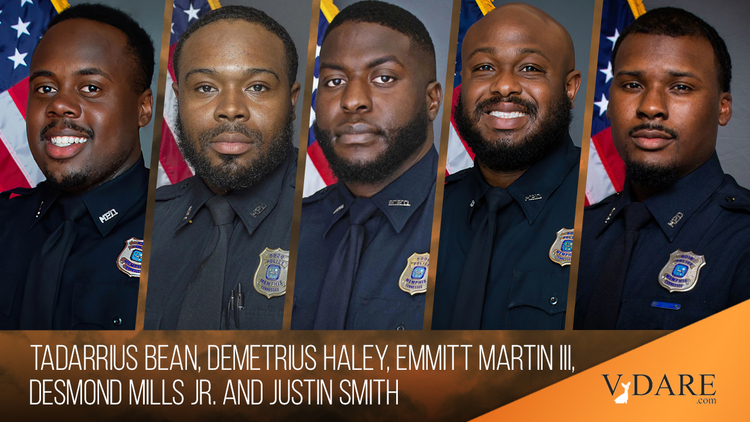
By Steve Sailer
01/28/2023
Earlier by Ann Coulter: Would It Kill You To Hire More Black Cops? (Yes)
iSteve commenter Twinkie asks about the Memphis police scandal in which five black cops beat a black motorist resisting arrest to death:
Less explored and more salient question here is the discipline rate of police officers by race. Blacks in other professions — law, medicine, etc. — are disproportionately sanctioned for misconduct, which confirms the notion of mismatch due to affirmative action. Does this also apply to law enforcement? I would think so, but I’d like to see the data.
Charles Murray’s 2021 book Two Truths features many examples of how black affirmative action hires tend to get in serious trouble for screwing up, just as The Bell Curve would predict.
The population of Memphis is 65% black while the police force is 58% black and the surrounding hinterlands are somewhat whiter. This high percentage of black cops suggests a fairly strong degree of affirmative action in Memphis Police Department hiring, maybe something like a 100 IQ for white applicants and an 88 IQ for black applicants.
I’ve always felt that affirmative action could be more reasonably be justified in police hiring than in just about any other field. As etymology would suggest, the police are inherently political. While 65% of Memphis residents are black, 93% of 2021’s known homicide offenders were black. Presumably, crime witnesses fall in between the two figures.
On the other hand, there is a definite price to be paid for police departments scraping the bottom of the barrel harder for black applicants, such as black cops screwing up more.
From a press release from Indiana University during the Racial Reckoning:
Black police officers disciplined disproportionately for misconduct, IU research finds
FOR IMMEDIATE RELEASE
Oct 12, 2020BLOOMINGTON, Ind. — An examination of racial differences in the disciplining of police officers in three of the largest U.S. cities consistently found that Black officers were more frequently disciplined for misconduct than white officers, despite an essentially equal number of allegations being leveled. This included allegations of severe misconduct.
“We found a consistent pattern of racial differences in the formal recording of disciplinary actions in three different major metropolitan cities: Chicago, Philadelphia and Los Angeles,” wrote a group of six management professors at the Indiana University Kelley School of Business. “Our results showed that Black officers were more likely to have recorded cases of misconduct, despite there being no difference between Black and white officers in the number of allegations made against them.”
In other words, quite possibly, a higher proportion of valid allegations are made against black cops, whereas white cops get besieged with more bogus allegations that don’t stand up to investigation.
”It is impossible to know whether these differences are due to racial bias versus some other unmeasured factors. However, it is noteworthy that the pattern of results is in line with what theories of racial bias would predict and with evidence of racial disparities in punishment in other settings.”
For example, black schoolboys get disciplined more than white schoolboys or Asian schoolgirls, which is, a priori, proof that nice white lady schoolteachers hate black boys.
Authors of the article, “The Race Discipline Gap: A Cautionary Note on Archival Measures of Behavioral Misconduct,” are Sheri Walter, Eric Gonzalez-Mulé, Cristiano Guarana, Ernest O’Boyle Jr., Chris Berry and Tim Baldwin. All are in Kelley’s Department of Management and Entrepreneurship. The article is forthcoming in the journal Organizational Behavior and Human Decision Processes.
Using archival data, they found that Black officers in Chicago were disciplined at a 105 percent higher rate than white officers. In Philadelphia, Black officers were 48 percent more likely than white officers to have been disciplined. Allegations of misconduct include lack of service and verbal or physical assault.
After controlling for the number of allegations of misconduct, they found that Black officers were disciplined at an even higher rate — 132 percent more often than white officers.
Given prior studies that Black people are more likely to be arrested, receive longer prison sentences and be suspended from school, the researchers set out to study whether Black employees — when compared to white employees — were subject to systematic differences in the documentation of misconduct.
“Similar to the issues facing the criminal justice and education systems, where racial disparities in punishment are well-documented, organizations face a difficult challenge in detecting and enforcing misconduct,” researchers wrote. “Even when organizations adopt seemingly objective policies for addressing misconduct, it is still possible for certain groups to be disproportionately accused of misconduct and/or disciplined.”
On the other hand, that’s also the way bell curves work.
This is a content archive of VDARE.com, which Letitia James forced off of the Internet using lawfare.